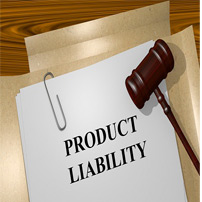MENU
- Home
- Overview
- Attorneys
- Practice Areas
- Firm News
- Blog
- Contact
 Dangerous or defective products cause injury to millions of consumers each year, according to the United States Consumer Product Safety Commission. The injuries arise from various products including household appliances, toys, and all-terrain vehicles. If a consumer uses a product and is injured, he or she may have a valid product liability claim. There are three main types of product liability claims: manufacturing defect, design defect, and failure to warn.
Dangerous or defective products cause injury to millions of consumers each year, according to the United States Consumer Product Safety Commission. The injuries arise from various products including household appliances, toys, and all-terrain vehicles. If a consumer uses a product and is injured, he or she may have a valid product liability claim. There are three main types of product liability claims: manufacturing defect, design defect, and failure to warn.
This type of claim is based on the defective manufacturing of a product. This occurs when a product departs from its intended design, therefore rendering it more dangerous than expected. Common examples include contaminated medicine or an improperly assembled bicycle.
This type of claim does not require proof that the manufacturer was negligent in designing the product, but rather only that the product was erroneously manufactured. Therefore, the defendant’s exercise of care and good intentions are not relevant. The error in manufacturing alone is generally enough to establish a defective manufacturing claim if the error – and not the claimant’s own negligent action – was the cause of the claimant’s injury.
A defective design claim arises when a product’s design is inherently flawed, rendering it unreasonably dangerous. Because the plans themselves are defective, it does not matter if the manufacturer follows them without error. Therefore, although the product may be manufactured as intended, the underlying defect in its design caused it to be unreasonably dangerous. Common examples include toys intended for children that contain choking hazards or a poorly designed ladder that does not support the amount of weight intended.
Claims for defective design will succeed only if the claimant sustained injury from a product’s defective design when they used the product in a reasonable manner and did not misuse the product. For example, a consumer who removes a safety guard from a tool may not be able to recover if they suffer injury from the altered product. Likewise, a consumer who uses a product in a way that the manufacturer did not intend and could not have foreseen may not be able to recover compensation for their injuries.
In this type of product liability claim, a claimant must establish that they suffered injury because they were not provided adequate warnings or instructions regarding the product’s use. If consumers are not instructed on how to handle and use the product safely and were injured as a result, they may be entitled to damages if the dangers were non-obvious and unpredictable. Some examples are a tea kettle that does not contain adequate warnings regarding an oddly positioned steam valve or a baby car seat that does not have a label with weight specifications. A knife manufacturer, however, would not be liable for a consumer’s injuries due to the blade’s sharpness because the danger was obvious and predictable.
Manufacturers have a duty to stay knowledgeable about their products, therefore if they fail to warn the public of risks they should have known about, they may be liable for consequent injuries. Warnings should be placed in a conspicuous location, understandable to the average user of the product and informative about the risks and how to avoid them.
If you have been injured by a defective product, contact a knowledgeable Wilmington product liability lawyer at Jacobs & Crumplar, P.A. Our offices are located in Wilmington and Georgetown, Delaware and we represent clients throughout the state, including those in Dover, Delaware. Contact us online or call us at 302-656-5445 today to schedule a free consultation.